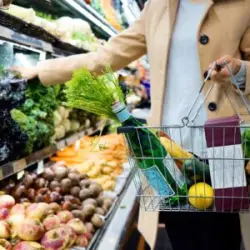
Grocery stores are a staple of many of our lives, but when it comes to safety, there is always potential for danger. From products that fall off shelves or displays to negligent security and faulty equipment, grocery store owners have an obligation to keep their customers safe from harm.
If you or your loved one suffered injuries at a grocery store, you might want to speak with a knowledgeable attorney. Our Las Vegas premises liability attorneys at H&P Law can investigate your case and help you understand whether or not you can file a suit against the grocery store for failing to maintain safe premises.
Safety Hazards in Grocery Stores That Can Lead to Injuries
Let’s discuss five common safety hazards found in grocery stores so you can stay informed and know what to look out for when visiting your local store.
1. Being Struck by Products That Fall Off Shelves or Displays
There is nothing more annoying than being hit by something unexpectedly while you shop. Unfortunately, falling products can cause serious injury if they hit someone in the head, neck, or face. To prevent this from happening, grocery stores should ensure that all products are properly secured on the shelves or displays and regularly check that items are not stacked too high or too close together.
2. Slip-and-Fall Hazards
Wet floors are one of the most common causes of slip-and-fall accidents in grocery stores. Spilled liquids like food and drinks can create an unsafe environment for customers as well as employees who may not see them due to poor visibility or lighting issues. To avoid slips and falls in the store, the store’s staff must ensure there is proper signage warning people about wet surfaces. Additionally, employees must frequently inspect the premises for spills and clean them up quickly if they occur.
Fact: Falls are the leading cause of preventable injury in the United States, which is responsible for over 6.8 million trips to emergency rooms per year, according to the National Safety Council.
3. Tripping Hazards
Loose wires or cords, as well as objects on walking surfaces, can be a tripping hazard if left unsecured on the floor of a grocery store. If a customer trips over such hazards, it could lead to serious injury due to the sudden impact with the ground surface. To avoid this issue, wires and cords must be properly secured along walls or away from foot traffic areas where possible, while boxes or other objects should not clutter walkways and aisles.

4. Negligent Security
Grocery stores should take measures to ensure visitors feel safe while they shop by having adequate security personnel present at all times during operating hours. This includes surveillance cameras placed throughout the store as well as having an appropriate number of security guards available to assist customers if needed. Additionally, providing emergency exits with clear signage and instructions is important in case of fire or other emergency situations that may arise while shoppers are in the store.
5. Faulty Equipment in the Store
Faulty equipment, such as elevators/escalators and checkout stands, can also cause injury if not maintained properly on a regular basis. Customers should pay attention to signs posted around these machines warning individuals when they need maintenance done or when there is a malfunctioning part that needs repair immediately. It is also important for employees to inspect these machines regularly so any problems can be identified before someone gets hurt.
Discuss Your Case With Our Attorneys at H&P Law
Grocery stores have an obligation to keep their customers safe from harm by taking precautions against common safety hazards. By being aware of these potential risks, shoppers can help protect themselves from accidental injuries while shopping at their local store. If you or someone you love has been injured at a grocery store, our premises liability attorneys at H&P Law can help. Discuss your case with our experienced attorneys to determine whether or not you can receive compensation for your injuries and losses. Call (702) 598-4529 to set up a case review.




